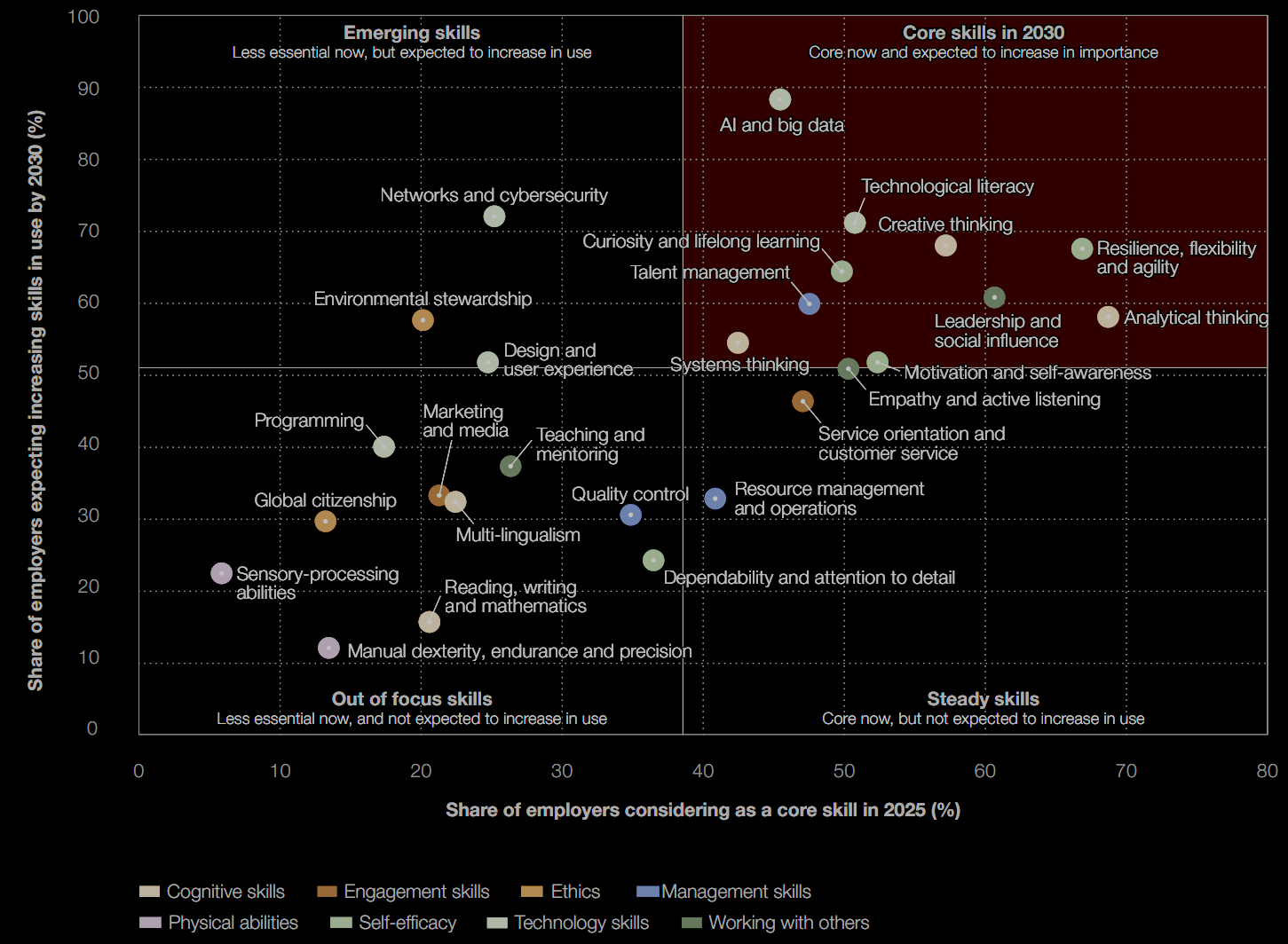Resilience, Flexibility, Agility: the soft-skill refactor every cloud consultant needs

Resilience, Flexibility, Agility: the soft-skill refactor every cloud consultant needs
Introduction
The cloud revolution isn’t just about mastering Kubernetes or multi-cloud architectures – it’s also reshaping the soft skills that technology consultants need to thrive. In an era of constant change, Resilience, Flexibility, and Agility (RFA) have moved from “nice-to-have” to mission-critical for cloud professionals. The World Economic Forum’s latest Future of Jobs survey shows that “resilience, flexibility and agility” rank among the very top skills employers seek for 2025.
The Rise of RFA in Tech Consulting
It’s no coincidence that Resilience, Flexibility, Agility have shot up the priority list just as cloud computing and digital transformation accelerate. The World Economic Forum (WEF) notes a “fundamental change” in how organizations view skills: these adaptability and self-management skills now outrank even some technical skills like programming or technology design.
In WEF’s Future of Jobs Report 2025, 67% of surveyed employers identified “resilience, flexibility, and agility” as a core skill for their workforce – second only to analytical thinking. This reflects a broader trend: as technology evolves rapidly (AI, cloud, automation), companies prize talent who can manage change, handle uncertainty, and keep learning.
LinkedIn’s workforce insights echo this. In LinkedIn’s analysis of skills for the next 5 years by Teammeter, “Flexibility and Agility” appear as a top soft skill, defined as the ability to “adapt quickly to new challenges, learn continuously, and thrive in uncertain environments”. Essentially, cloud consultants are expected not only to be cloud experts, but also agents of change – professionals who can roll with shifting requirements, recover from setbacks, and sprint ahead when market conditions pivot.
Forbes has described this trend even earlier than WEF - "Mindset before skill set and tool set". It's not a very new thing, many employers know that college graduates of fields like physics/mathematics are capable of learning difficult things, which indicates their ability (or will?) for life-long development. With a proper mindset, You can always get new skills much easier than if You're forced to.
Why now? Consider the environment: Cloud projects often involve fast-moving parts (new tools, changing client needs, sudden scale-ups). The COVID-19 pandemic and the shift to remote work further underscored the value of resilience and adaptability in teams. As one LinkedIn commentator - Dezzi Rae Marshall - quipped, these so-called “soft” skills are actually “power skills” in the AI and cloud era – the human qualities that give organizations their competitive edge. AI can automate routine tasks, but “analytical thinking, resilience, flexibility and agility... Humans for the win!” as a tech career coach observed.
And AI can be also a great tool to analyze a given, specific problem, but it's not yet able to define problems of businesses, especially those in early/mid-early phase of digitalization. I can't yet imagine humanoid Al that enters a factory somewhere on the countryside, or in the rural area, to investigate for fields to improve.

Source: World Economic Forum - Future of Jobs 2024
Actionable Strategies to Build R, F, A
This section may be slightly boring for some. If You feel so, move to the next one.
How can cloud consultants and the organizations that employ them develop these soft skills? It’s not as straightforward as learning a new coding language, but there are concrete steps and frameworks that help:
Mentorship and Mindset Coaching: Pair junior consultants with seasoned mentors who exemplify calm resilience and adaptability. Hearing war stories of how a senior cloud architect navigated a massive outage or an ever-shifting project builds a mental toolkit for coping. Some firms are even bringing in professional coaches or psychologists to run sessions on growth mindset, time management, and stress reduction techniques – all contributing to a resilient workforce. Investing in mental health and burnout prevention is also key: as one leadership article noted, leaders must balance “the tug of war between pressure and principle,” ensuring teams strive for results and avoid burnout. Encouraging time for learning and reflection helps consultants stay motivated and agile learners, rather than feeling constantly in reactive mode.
Cultivate a Culture of Flexibility: Organizational culture plays a huge role. Companies like Amazon famously value agility – encapsulated in principles like “Learn and Be Curious” and “Bias for Action.” Consulting teams can emulate this by celebrating adaptability: for example, recognizing a consultant who pivoted the solution to meet a new client need, or who proactively learned a new AWS service to solve a problem. Make it clear that it’s okay to change course when evidence demands it. This removes the fear of deviating from the original plan. LinkedIn’s Workforce Report suggests that companies prioritizing adaptability see better performance in fast-changing environments. In practice, that could mean allowing consultants to propose innovative approaches (even if untested), or enabling flexible work arrangements that themselves demand personal agility (remote teaming across time zones, etc.).
Frameworks and Assessments: Some organizations use frameworks to assess and develop these soft skills. For instance, WEF’s skills outlook provides metrics (% of employers valuing each skill) that can inform internal evaluations. Consultants might self-assess or get 360-feedback on attributes like “adapts to change” or “handles pressure.” There are also models like the “Resilience at Work” framework or learning agility assessments that pinpoint areas to improve (e.g., do you explore many approaches to a new problem? How do you react to failure?). Setting personal development OKRs around soft skills (e.g., “volunteer for a challenging project outside my comfort zone this quarter”) can drive intentional growth.

The Payoff: Future-Ready Cloud Consultants
Embracing Resilience, Flexibility, and Agility isn’t just a personal growth exercise – it’s a strategic imperative for any consulting firm or cloud services provider. According to the WEF, companies foresee “analytical thinking (69%) and resilience, flexibility, and agility (67%)” as the top core skills for 2025, reflecting a need for an agile, innovative, and collaborative workforce.
Cloud consultants who embody these skills will be better at navigating client organizations through digital transformations. They’ll instill confidence: a client is more likely to trust a consultant who stays composed when an AWS outage strikes at a critical moment, versus one who panics or rigidly insists on an obsolete plan.
Moreover, these soft skills directly impact project success. A resilient consulting team can maintain momentum and morale despite setbacks (preventing project stalls). A flexible consultant can incorporate client feedback late in the project without derailing it, leading to a product that actually fits the client’s evolving needs (versus delivering a solution to yesterday’s problem). An agile-minded consultant will not over-engineer upfront, but rather deliver iterative results – which aligns perfectly with cloud’s on-demand, scalable nature.
From a career perspective, consultants who cultivate RFA will find themselves more future-proof. As automation and AI take over certain technical tasks, the uniquely human capabilities – leadership, adaptability, creative problem-solving – become even more defining. It’s telling that Accenture’s Julie Sweet highlights learning agility for job seekers, and IBM lists problem-solving and adaptability among top valued skills.
The cloud consultant who can quickly learn the next cloud service or methodology, handle cross-functional collaboration, and bounce back from challenges will stand out in the talent market.
Conclusion
In cloud consulting, the only constant is change – in technologies, in project scope, in the business environment. The soft skills of Resilience, Flexibility, and Agility are the refactored code of the consultant’s mindset that allow them to not only cope with this reality, but harness it for success. Industry reports from the World Economic Forum and LinkedIn underscore that these skills are no longer optional; they are at the core of what makes a workforce effective in 2025 and beyond.
For mid-to-senior technology professionals, cultivating RFA might mean stepping outside the comfort zone of technical expertise and investing in personal development and emotional intelligence. For leaders of consulting practices, it means hiring and rewarding not just “cloud rockstars” but “cloud adapters” – those who show grit, curiosity, and quick thinking. The next time you embark on a cloud project, consider not just the technical design but the human factors: Is your team prepared to weather a storm and pivot if needed? Do they relish learning new things? Are they comfortable with the uncomfortable? By refactoring the soft skill set now, cloud consultants can ensure they remain as scalable, resilient, and innovative as the architectures they build.
Sources
https://hbr.org/2022/05/accenture-ceo-julie-sweet-on-the-most-important-skill-job-seekers-need-today
https://www.linkedin.com/pulse/future-skills-report-2025-teammeter-a3cie/
https://www.linkedin.com/pulse/essential-skills-2025-beyond-quest-staffing-solutions-ojtof/